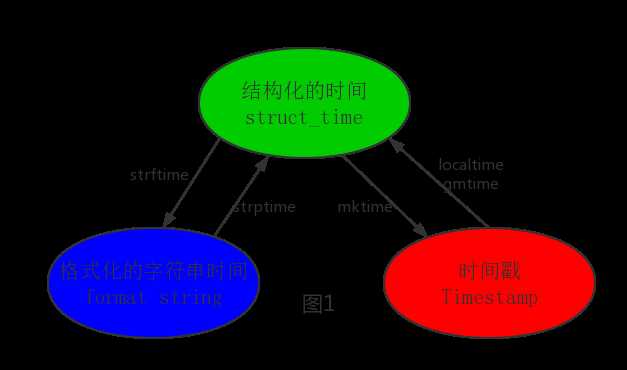标签:程序 either cloc python 避免 imp ros 定义 clock
1、模块的定义
模块:用来从逻辑上组织python代码(变量、函数、类、逻辑:实现一个功能),本质就是.py文件(例如文件名:test.py,对应的模块名则为test)。
包:用来从逻辑上组织模块,本质就是一个目录(必须带有一个__init__.py文件)
import模块的本质:导入模块的本质就是把python文件解释一遍。
import包的本质:导入包的本质就是解释包下面的__init__.py文件。
1 import module_druid # 实质是把module_druid中的所有代码都解释了(当前程序中执行)一便,然后赋值给了module_druid。 2 3 print(module_druid.name) # 调用模块中变量的方法。该方法需要加模块名名。 4 5 module_druid.func1() # 调用模块中的方法 6 7 print("华丽的分隔符".center(30, "~")) 8 9 from module_druid import name, func1 # 实质仅是把module_druid模块中的name变量,func1()放到当前程序中执行,而不是全部。 10 11 print(name) # 该方法不需要再加模块名 12 func1() # 该方法不需要再加模块名 13 14 print("华丽的分隔符".center(30, "~")) 15 16 from module_druid import * # 导入模块中所有的代码,在当前程序中执行。不建议这么使用,因为如果友重复的方法,会导致当前方法覆盖导入模块的方法。 17 18 from module_druid import func2 as druid_func2 # 取别名,避免重复 19 druid_func2() 20 21 print("华丽的分隔符".center(30, "~"))
2、time、datetime模块
2.1、 模块的语法
1 import time 2 3 4 print(time.clock()) # 返回处理器时间,3.3开始已废弃 , 改成了time.process_time()测量处理器运算时间,不包括sleep时间,不稳定,mac上测不出来 5 print(time.altzone) # 返回与utc时间的时间差,以秒计算\ 6 print(time.asctime()) # 返回时间格式"Fri Aug 19 11:14:16 2016", 7 print(time.localtime()) # 返回本地时间 的struct time对象格式 8 print(time.gmtime(time.time()-800000)) # 返回utc时间的struc时间对象格式 9 10 print(time.asctime(time.localtime())) # 返回时间格式"Fri Aug 19 11:14:16 2016", 11 print(time.ctime()) # 返回Fri Aug 19 12:38:29 2016 格式, 同上 12 13 14 # 日期字符串 转成 时间戳 15 string_2_struct = time.strptime("2016/05/22", "%Y/%m/%d") # 将日期字符串 转成 struct时间对象格式 16 print(string_2_struct) 17 18 struct_2_stamp = time.mktime(string_2_struct) # 将struct时间对象转成时间戳 19 print(struct_2_stamp) 20 21 22 # 将时间戳转为字符串格式 23 print(time.gmtime(time.time()-86640)) # 将utc时间戳转换成struct_time格式 24 print(time.strftime("%Y-%m-%d %H:%M:%S", time.gmtime())) # 将utc struct_time格式转成指定的字符串格式 25 26 27 #时间加减 28 import datetime 29 30 print(datetime.datetime.now()) # 返回 2016-08-19 12:47:03.941925 31 print(datetime.date.fromtimestamp(time.time())) # 时间戳直接转成日期格式 2016-08-19 32 print(datetime.datetime.now()) 33 print(datetime.datetime.now() + datetime.timedelta(3)) # 当前时间+3天 34 print(datetime.datetime.now() + datetime.timedelta(-3)) # 当前时间-3天 35 print(datetime.datetime.now() + datetime.timedelta(hours=3)) # 当前时间+3小时 36 print(datetime.datetime.now() + datetime.timedelta(minutes=30)) # 当前时间+30分 37 38 39 c_time = datetime.datetime.now() 40 print(c_time.replace(minute=3, hour=2)) # 时间替换
2.2、 参数解释
| Directive | Meaning | Notes |
|---|---|---|
%a |
Locale’s abbreviated weekday name. | |
%A |
Locale’s full weekday name. | |
%b |
Locale’s abbreviated month name. | |
%B |
Locale’s full month name. | |
%c |
Locale’s appropriate date and time representation. | |
%d |
Day of the month as a decimal number [01,31]. | |
%H |
Hour (24-hour clock) as a decimal number [00,23]. | |
%I |
Hour (12-hour clock) as a decimal number [01,12]. | |
%j |
Day of the year as a decimal number [001,366]. | |
%m |
Month as a decimal number [01,12]. | |
%M |
Minute as a decimal number [00,59]. | |
%p |
Locale’s equivalent of either AM or PM. | (1) |
%S |
Second as a decimal number [00,61]. | (2) |
%U |
Week number of the year (Sunday as the first day of the week) as a decimal number [00,53]. All days in a new year preceding the first Sunday are considered to be in week 0. | (3) |
%w |
Weekday as a decimal number [0(Sunday),6]. | |
%W |
Week number of the year (Monday as the first day of the week) as a decimal number [00,53]. All days in a new year preceding the first Monday are considered to be in week 0. | (3) |
%x |
Locale’s appropriate date representation. | |
%X |
Locale’s appropriate time representation. | |
%y |
Year without century as a decimal number [00,99]. | |
%Y |
Year with century as a decimal number. | |
%z |
Time zone offset indicating a positive or negative time difference from UTC/GMT of the form +HHMM or -HHMM, where H represents decimal hour digits and M represents decimal minute digits [-23:59, +23:59]. | |
%Z |
Time zone name (no characters if no time zone exists). | |
%% |
A literal ‘%‘ character. |
2.3、 时间格式之间的转换

1 import time 2 # --------------------------按图1转换时间 3 # localtime([secs]) 4 # 将一个时间戳转换为当前时区的struct_time。secs参数未提供,则以当前时间为准。 5 time.localtime() 6 time.localtime(1473525444.037215) 7 8 # gmtime([secs]) 和localtime()方法类似,gmtime()方法是将一个时间戳转换为UTC时区(0时区)的struct_time。 9 10 # mktime(t) : 将一个struct_time转化为时间戳。 11 print(time.mktime(time.localtime()))#1473525749.0 12 13 14 # strftime(format[, t]) : 把一个代表时间的元组或者struct_time(如由time.localtime()和 15 # time.gmtime()返回)转化为格式化的时间字符串。如果t未指定,将传入time.localtime()。如果元组中任何一个 16 # 元素越界,ValueError的错误将会被抛出。 17 print(time.strftime("%Y-%m-%d %X", time.localtime()))#2016-09-11 00:49:56 18 19 # time.strptime(string[, format]) 20 # 把一个格式化时间字符串转化为struct_time。实际上它和strftime()是逆操作。 21 print(time.strptime(‘2011-05-05 16:37:06‘, ‘%Y-%m-%d %X‘)) 22 # time.struct_time(tm_year=2011, tm_mon=5, tm_mday=5, tm_hour=16, tm_min=37, tm_sec=6, 23 # tm_wday=3, tm_yday=125, tm_isdst=-1) 24 # 在这个函数中,format默认为:"%a %b %d %H:%M:%S %Y"。
标签:程序 either cloc python 避免 imp ros 定义 clock
原文地址:http://www.cnblogs.com/Druidchen/p/8001380.html